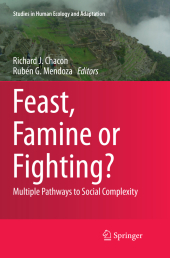 Neuerscheinungen 2018Stand: 2020-02-01 |
Schnellsuche
ISBN/Stichwort/Autor
|
Herderstraße 10
10625 Berlin
Tel.: 030 315 714 16
Fax 030 315 714 14
info@buchspektrum.de |

Richard J. Chacon, Rubén G. Mendoza
(Beteiligte)
Feast, Famine or Fighting?
Multiple Pathways to Social Complexity
Herausgegeben von Chacon, Richard J.; Mendoza, Rubén G.
Softcover reprint of the original 1st ed. 2017. 2018. xxix, 490 S. 41 SW-Abb., 108 Farbabb., 30 Farbtab
Verlag/Jahr: SPRINGER, BERLIN; SPRINGER INTERNATIONAL PUBLISHING 2018
ISBN: 3-319-83933-0 (3319839330)
Neue ISBN: 978-3-319-83933-2 (9783319839332)
Preis und Lieferzeit: Bitte klicken
The advent of social complexity has been a longstanding debate among social scientists. Existing theories and approaches involving the origins of social complexity include environmental circumscription, population growth, technology transfers, prestige-based and interpersonal-group competition, organized conflict, perennial wartime leadership, wealth finance, opportunistic leadership, climatological change, transport and trade monopolies, resource circumscription, surplus and redistribution, ideological imperialism, and the consideration of individual agency.
However, recent approaches such as the inclusion of bioarchaeological perspectives, prospection methods, systematically-investigated archaeological sites along with emerging technologies are necessarily transforming our understanding of socio-cultural evolutionary processes. In short, many pre-existing ways of explaining the origins and development of social complexity are being reassessed.
Ultimately, the contributors to this edited volume challenge the status quo regarding how and why social complexity arose by providing revolutionary new understandings of social inequality and socio-political evolution.
Chapter 1:.- Introduction.- Chapter 2: Violence, Warriors, and Rock Art in Bronze Age Scandinavia.- Chapter 3: Societal Dynamics of Prestate Societies of the North Central European Plains, 600-900 CE.- Chapter 4: Trade and State Formation in Ancient East African Coast and Southern Zambezia.- Chapter 5: Feasting, Social Complexity and the Emergence of the Early Neolithic of Upper Mesopotamia: A View from Göbekli Tepe.- Chapter 6: Highly Stratified Societies without Permanent Leadership: Yi in Liangshan of Southwestern China.- Chapter 7: Coercive Power and State Formation in Northern Vietnam.- Chapter 8: The Emergence of Sociopolitical Complexity: Evidence from Contact-era New Guinea.- Chapter 9: Tibenuk and Chuji: Status Attainment and Collective Action in Egalitarian Settings.- Chapter 10: Early Pueblo Great House Communities and Their Leaders: The Transformation of Community Leadership in the Mesa Verde and Chaco Regions, A.D. 625-1025.- Chapter 11: The Development of Complex Societies in Eastern North America: The Roles of Feasting, Famine, and Fighting.- Chapter 12: The Feast before Famine and Fighting: The Origins and Consequences of Social Complexity in the Mirador Basin, Guatemala.- Chapter 13: Tollan Teotihuacan: Multiethnic Mosaics, Corporate Interaction, and Social Complexity in Mesoamerica.- Chapter 14: Pathways to Social Complexity in the Norte Chico Region of Peru.- Chapter 15: How Chiefdom and Early State Social Structures Resolve Collective Action Problems.- Chapter 16: Commentary.- Chapter 17: Multiple Pathways to Large-Scale Human Cooperative Networks: A Reframing .


